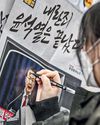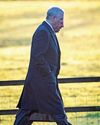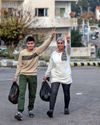
Recently in Taiwan, a well-known obstetrician-gynaecologist posted a public service announcement on Facebook. Dr Chih Chun Chen, a director of the Eugene Postpartum Nursing Care Center, told couples to put 8 May in their calendar if they wanted to give birth to a dragon baby. "Sowing should be completed by 15 May of this year at the latest," Chen said. "You have to work hard during the New Year!"
Last weekend marked the start of the Year of the Dragon. The dragon is the only mythical creature of the 12 in the zodiac calendar, and is seen as the most auspicious, with those born under its sign destined for success.
This year there is an extra layer of significance, as many countries in Asia are experiencing declining birthrates, leading to an ageing population and predictions of dire economic consequences. Singapore's prime minister, Lee Hsien Loong, said in his lunar new year message: "Now is as good a time as any for young couples to add a little dragon' to your family."
China, home to almost a fifth of the world's people, recently entered a population decline, and government efforts to boost the birthrate with financial incentives and other policies have had little impact.
Hank, a dragon baby born in 2000 in a small town in Shaanxi province, north-central China, recalled feeling a certain pressure growing up. "I am the only dragon boy. So in my father's family, they have really high expectations from me," he said from the UK, where he is now a university student.
Denne historien er fra February 16, 2024-utgaven av The Guardian Weekly.
Start din 7-dagers gratis prøveperiode på Magzter GOLD for å få tilgang til tusenvis av utvalgte premiumhistorier og 9000+ magasiner og aviser.
Allerede abonnent ? Logg på
Denne historien er fra February 16, 2024-utgaven av The Guardian Weekly.
Start din 7-dagers gratis prøveperiode på Magzter GOLD for å få tilgang til tusenvis av utvalgte premiumhistorier og 9000+ magasiner og aviser.
Allerede abonnent? Logg på

'It's really a disaster' The fight to save lives as gang war consumes capital
Dr James Gana stepped out on to the balcony of his hospital overlooking a city under siege. \"There's a sensation of 'What's next?'. Desperation is definitely present,\" the Médecins Sans Frontières (MSF) medic said, as he stared down at one of scores of camps for displaced Haitians in their country's violence-plagued capital.

Trailblazers The inspiring people we met around the world this year
From an exuberant mountaineer to a woman defiantly facing the guns of war, here are some of the brave individuals who gave us hope in a tumultuous 2024

Votes of confidence
From India to Venezuela and Senegal to the US, more people voted this year than ever before, with over 80 elections across the world. With rising authoritarianism and citizen-led resistance revealing its vulnerabilities and resilience in the face of unprecedented challenges, has democracy reached its breaking or turning point?

Out of touch How president sealed his own fate in martial law gambit
For Yoon Suk Yeol, this month's short-lived martial law declaration wasn't just a catastrophic miscalculation - it was the culmination of a presidency that had been troubled from the start.

Son of the soil Who is François Bayrou, the farmer turned prime minister?
François Bayrou, the new French prime minister, calls himself a country man. A tractor-driving \"son of the soil\" and breeder of thoroughbreds, he has run for president three times, saying his rural roots and centrist politics led him to try to find common ground between left and right.

Power plant workers keeping the lights on
The Guardian Weekly visits a Soviet-era coal-fired thermal installation to learn how it has held up to Russian attacks

Prince charmed Alleged spy scandal may have exposed China threat
Prince Andrew should be commended for doing Britain a great service, according to longstanding China watcher Charles Parton. The now marginalised royal has, the analyst observed, \"almost single handedly\" succeeded \"in highlighting the threat to free and open countries\" posed by the contemporary Chinese state.

In Moscow, a new life of secluded irrelevance awaits Assad
He was whisked away without a last message to his people, the aircraft's transponder deliberately switched off to avoid detection as it departed from an airbase in Syria.

'We fear new oppression' Alawites worry over rebel rule
To prepare khubeiza, the leaves of the kale-like plant must be roughly chopped and sauteed with onions, garlic and a dash of salt. According to folklore, the recipe originated among the Alawite communities who lived in Syria's mountainous coastline where the fibrous, wild-growing plant can be found in abundance. So poor were the Alawites in Ottoman times, the story goes, that the only food they could find to eat was khubeiza, which sprouts like a stubborn weed every spring.

'Gisèle is waiting for explanations'
The Pelicot rape trial has horrified the world. But as it comes to an end, the questions it has raised about French society and rape culture have still not been answered.